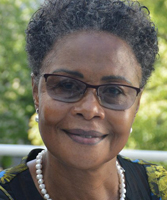Alumni of the Month

Hulda Shaidi SWAI
YEAR OF MATRICULATION: 1977
EDUCATION:
Hulda Shaidi Swai [née Shaidi] is the University of Dar es Salaam’s ‘Alumna of the Month’ for August 2020. She is presently a Professor at Tanzania’s Nelson Mandela African Institute of Science and Technology (NM-AIST) in Arusha. Hulda was born sixty-six years ago, in 1954, in Vudee, Same district in Kilimanjaro region. She went to primary school in her home district, thereafter to Tambaza secondary school in Dar es Salaam (for junior secondary forms I-IV) and Kilakala girls secondary school in Morogoro (for senior forms V and VI). She had obtained very good school records at both the ‘Ordinary’ and the ‘Advanced’ Certificate of Secondary Education examinations, by 1976, which guaranteed her progression to university studies. In 1977, Hulda was admitted to the University of Dar es Salaam at the Faculty of Science [now called College of Natural and Applied Sciences] for a three-year degree programme where she majored in Chemistry and Statistics. She completed her programme successfully in 1980.
On completion of her university studies at UDSM, Ms. Shaidi was employed by a parastatal organisation, the National Development Corporation (NDC), for a few years as a development scientist before she left for postgraduate studies at the University of London in the U.K. from the mid-1980s. An intellectually charged and highly aspiring young woman, Hulda undertook and completed her Master’s and doctoral programmes (1984-1985 and 1998-2000 respectively) within ‘record time’ of 9 years of research training and application until 2000. Having acquired a vast experience of scientific research, she had the possibilities of being absorbed into employment with Research and Development (R&D) institutions and industry in the U.K. This was the case the four/five years that followed, when, in early 2004/5, she relocated to South Africa, working in various positions of a scientist (in research, innovation and development) for about a decade.
In South Africa, she played a few key roles in the research field, including a research fellowship in materials science and manufacturing at the Council for Scientific and Industrial Research (CSIR) based in Pretoria (April 2001 to 2013) and an extraordinary professorship at the University of Pretoria for joint projects and supervision with CSIR (2013-2014). At the University of Pretoria, she founded and chaired a Pan-African Centre of Excellence in Applied Nanomedicine Research and Training, which focused attention on infectious diseases that originate from poverty conditions. This was a unique joint research effort between the Department of Science and Technology-(DST) and the CSIR concentrating efforts on finding solutions specifically for poverty-related diseases such as TB, malaria and HIV/Aids through the revolutionary field of Nano-medicine.
She explains:
“The field of Nano-medicine has a great number of applications. A cross-cutting theme is that it works at a molecular or atomic scale. The CSIR’s Nano-medicine research programme pertains specifically to the repackaging of already existing medicines for poverty-related diseases such as tuberculosis (TB), using nanotechnology, in order to enhance its efficacy. Poverty-related diseases have been and still are a neglected area of research by the world’s primary pharmaceutical companies and researchers in the developed world. Where Nano-medicine has effectively been applied to develop products for money-spinning diseases such as cancer, it is [now] left to African researchers and those in other developing areas of the world to concentrate on poverty-related diseases.”
In November 2012, Prof. Swai hosted a first Pan-African Summer School in Nano-medicine, where over 100 young researchers underwent theoretical training, complemented with laboratory exposure, which covered all the concepts of nanomedicine from lab to clinic. The participating instructors were excellent nanomedicine and infectious-disease experts from across the globe.
Prof. Hulda Swai joined the Nelson Mandela African Institute of Science and Technology (NM-AIST) in July 2015 as an Associate Professor in the School of Life Science and Bioengineering. She has since been teaching, researching, as well as supervising postgraduate research students. She has also been busy writing research reports for publication and concept papers for research projects. While in South Africa she assisted in developing a Master’s degree programme in Nano-science, at NM-AIST in Arusha she has been doing the same for the Eastern-southern Africa region, through World Bank funding. The University of Dar es Salaam is surely proud of a scientist—and more of a female scientist—involved in innovative research that would favourably position Tanzanian on a journey towards realising its Development Vision, 2025.

